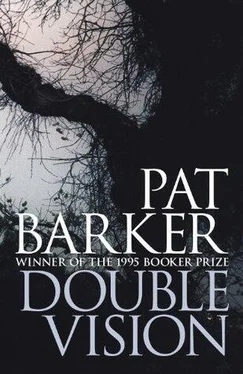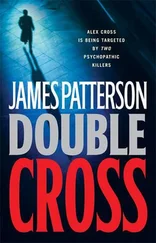‘This is ideal,’ Stephen said, looking round.
‘You should be able to work, at least. It’s quiet enough.’ He seemed to be debating whether to say anything more. At last he said, ‘Stephen, are you all right?’
‘I’m fine, Robert, honestly. Just a bit tired.’
They looked at each other, slightly awkward, aware of the silence, then somewhere at the back of the cottage an owl hooted. As if this were a signal, Robert said, ‘I’ll leave you to settle in.’
As soon as Robert had gone, Stephen looked all over the cottage, feeling a surge of pleasure as he took in his surroundings. Despite the fire there was a chill in the air, but then the cottage had been standing empty for a year, the foot-and-mouth epidemic having destroyed the market for weekend breaks.
A small kitchen and, upstairs, a tiny bathroom. In the front bedroom there was a desk and chair, useless for writing, at least in their present position, because they were too close to the window. Flying glass. He’d always felt bizarrely safe in the Holiday Inn in Sarajevo because the glass in the windows was long gone. He would lie curled up, fingers thrust into his armpits, hoarding warmth, and listen to the pitter-patter of rain on the polythene sheets that divided him from the thudding sky, until the mingled sound of rain and small-arms fire became a lullaby. He missed it when he got home. Surrounded by leafy trees and the hum of London traffic, he’d found it impossible to sleep. At the time he’d preferred to regard this as a personal quirk rather than as a symptom of post-traumatic stress disorder. He still did.
The back bedroom was larger. He stood at the small, ivy-fringed window, looking out over the garden. A patch of lawn, shrubs, a path leading down to a gate and beyond that, on the crest of a hill, a copse of deciduous trees. Bare branches clotted with rooks’ nests stood out against the smoky red of the sky.
He took off his trainers, shirt and jeans and stretched out on the bed, telling himself he couldn’t possibly sleep, and, almost immediately, slept. Once, he jerked awake at a sudden sound — the creak of a floorboard perhaps? — but the sound wasn’t repeated and he made himself relax. Somewhere near by an owl hooted, and he waited for the scream of a small creature finding dusk turn to night in the shadow of immense wings. Nothing. The owl hooted again. It must have a nest up there among the trees.
Drowsily, he tried to catch the words that were drifting through his brain. Something to do with owls being restless in a place where people had met violent deaths, but he couldn’t remember, and anyway it was nonsense, nobody had died here, or only in their beds of sickness or old age. No violent deaths since the union of England and Scotland brought the long centuries of border raiding to a close. No skulls in the grass, no girls with splayed thighs and skirts around their waists revealing, even in the early stages of decomposition, what had been done to them before they died. No smell of decay clinging to the skin. Just a square of window fringed by dark leaves. He closed his eyes, and the window became a pattern floating on the inside of his lids, turning first to orange and then to purple before fading, at last, to black.
His sleep was threadbare, like cheap curtains letting in too much light. He woke, slept, turned over, slept again, and then woke finally with a cry in the blackness, disorientated, thinking he could hear the patter of rain on polythene.
But there was no sound of rain at the window, so the pattering must have come from his dream. Brutally awake now, he started to think about Ben, as he’d known he must sooner or later, coming here to Ben’s home ground.
It had been raining that night in Sarajevo, heavy showers falling as sleet and blown across the road. The cold hit him as he came out of the television centre and stood, upright and exposed, on the steps leading down to the street. The snow was pockmarked under his feet. He took a deep breath, dragging cold into his lungs, and was about to step down into the road when he heard a sound behind him and turned round to see Ben Frobisher come out of the swing doors behind him.
‘Do you mind if I tag along?’
Stephen did mind, but it was too late to say so. The armoured car had gone, and there was no other way of getting back to the hotel. He was secretly furious: the whole point of this walk was that he should do it alone.
They stepped out into a world so dark their faces and hands seemed to give off the only light. Far away on the horizon the flickering artillery rumbled. A flare went up, and, for one trembling second, the roofs were edged in blue, then darkness fell again, deeper than before.
Despite the cold, he started to sweat, raising his gloved hand to wipe his upper lip. The flak jacket and the body armour encumbered his movements, and he was aware of Ben walking in the same robotic way. They passed graffitied walls whose scribblings they couldn’t read, and then a block of flats with all its windows shattered, shards of glass lying in the slush around the chained gates. Despite the chains, people still lived here. He was aware of eyes all round them, of ears straining to listen as their feet slithered through the slush. In places the snow covered pieces of rubble. He was intensely aware of Ben, of the gleam of his eyes and teeth, of his body as a source of heat in the cold dark, almost as if the brain, deprived of vision, developed a kind of thermal-imaging technique. Far away to the right, in the darkness, snipers waited for somebody desperate enough for heating, or water, or food, to break cover and step out into the road.
As they approached the crossroads, he turned in his lumbering moon walk to Ben and pointed him deeper into the shadow of the building. Scuffing their shoulders, they scaled along the wall, then stopped for breath, side by side now, leaning against a door while they nerved themselves to face the dash across the open road. For two or three seconds they would be dark shapes against the glimmering whiteness.
‘Well?’ Ben whispered.
Stephen nodded, and braced himself against the door, which gave way under his weight so that he staggered back into the stairwell of the building. Ben followed, stopping when he was safely inside to examine the lock that had been smashed.
A flight of stairs led up into the dark. A scuffle from above, a sense of pricked ears and eyes watching. Ben produced a torch from his pocket, cupped his hand around the light, and shone it over the walls, so that they saw the dank passage and threadbare carpet veiled in his blood. His fingers were dark shadows in the ruby skin, like an X-ray, Stephen thought, and that red glow spread over the walls. Splinters of glass lying on the stairs had been crunched to a fine powder in the centre of the treads. Upstairs, the scuffling started again.
‘Up there,’ Ben whispered, pointing. He started to move towards the stairs.
Stephen caught his arm. ‘No, come on, leave it.’
Ben pressed on, not shaking him off, just quietly disengaging himself. Reluctantly, Stephen followed.
A smell of mould met them at the top of the first flight, and the red torchlight revealed fungus growing on a damp patch of plaster. Then other smells took over: the musty smell of old carpets covered in dog hairs, the burnt toast smell of dried urine on mattresses, and finally a smell Stephen fought against recognizing.
In a corner of the landing, away from the danger of flying glass, a girl huddled on a mattress. She didn’t speak or cry out or try to get away. Ben swung the beam along the wall until it found her face. Eyes wide open, skirt bunched up around her waist, her splayed thighs enclosing a blackness of blood and pain.
Читать дальше












